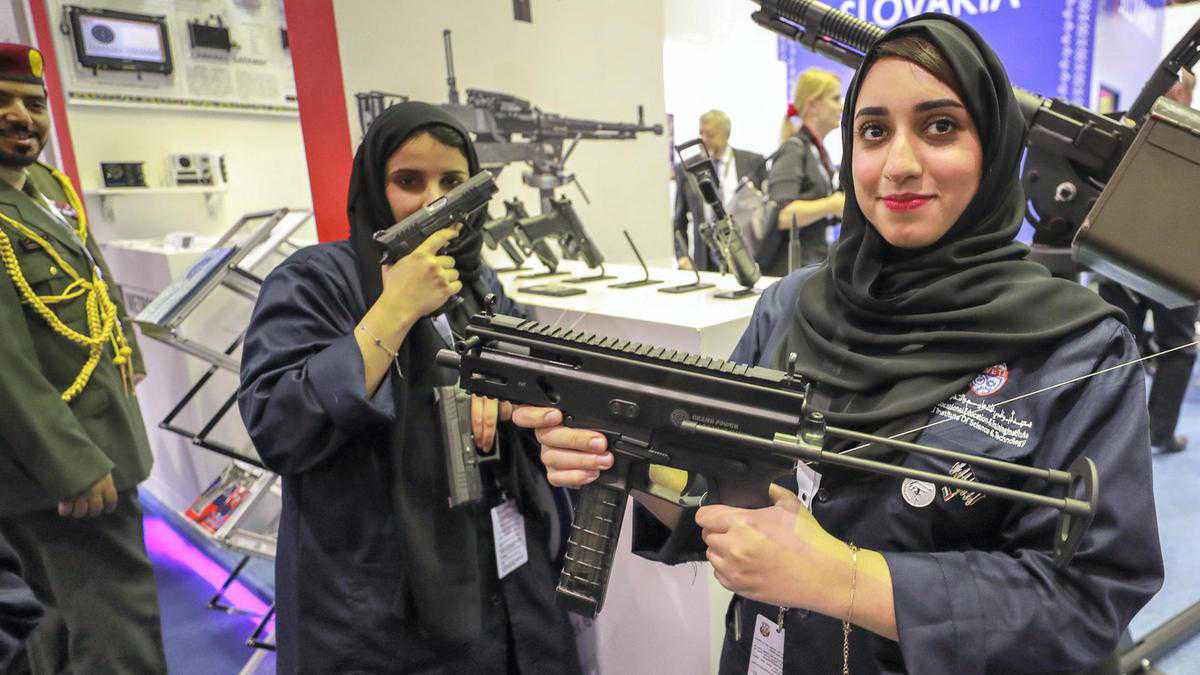From drones to submarines: What to expect at the center East's biggest defence expo
20 February, 2021

Gulf countries are expected to invest in advanced defence technologies, native military production capabilities and knowledge-transfer partnerships through the Middle East's largest defence expo found in Abu Dhabi in a few days.
Missile defence, drones, counter-unmanned aerial cars (UAVs), cyber reliability and artificial intelligence technology -which have played an integral part in contemporary warfare - will maintain demand among the regional buyers in the International Defence Exhibition (Idex), analysts said.
“It is likely that we will see greater focus on naval platforms, unmanned devices and electronic warfare capacities, in addition to continued support, training, maintenance, and sustainment contracts," Charles Forrester, business lead analyst at defence intelligence consultant Janes, told The National.
Defence spending by Gulf countries rose 5.4 % to $100 billion in 2020, up from $94.9bn in 2019, in line with the latest record by Janes.
The biennial defence expo, held from February 21 to 25, will gather top industry players wanting to showcase their most up-to-date technologies. Idex is also the first important defence event because the Covid-19 outbreak, as corporations make the most of face-to-face meetings to drive business.
Cybersecurity, autonomous systems, electronic warfare and ground-based atmosphere defence will still be of major curiosity to the region’s militaries, Mr Forrester said.
"Certain requirements for these technology come from both threat environment in the region, but also the changing deal with of modern military procedures and the features that they might need," he said. "The go up in the utilization of unmanned systems by point out and non-state actors implies that defending features, structures, and troops from assault and hostile reconnaissance provides increased. These threats could be dealt with by electronic warfare technology, together with kinetic means.”
The existing geopolitical challenges, such as threats from Iran and its own proxies, combined with the have to protect critical infrastructure such as oil assets, will spur the need for military equipment.
“The continued antagonism by Iranian forces in your community will also travel the need for surveillance sensor systems, and analysing the outputs by these devices, to make sure broader aims of steadiness. Utilising unmanned technology will deliver this drive multiplier and encourage protection," Mr Forrester said.
With the Covid-19 pandemic and subdued oil prices tightening budgets, governments must balance shelling out for healthcare with defence during the global health crisis.
Defence spending found in Gulf countries is projected to decline 9.4 per cent in 2021, before dropping to $89.4bn in 2022, according to Janes. It expects spending will go back to pre-pandemic levels by 2024.
"Governments in the region are organizing for only modest income increases in 2021, coupled with social and wellbeing expenditures and extreme vaccination campaigns, which plainly requires careful reassessment of defence and reliability spending," Aleksandar Jovovic, principal at Washington DC-based consulting firm Avascent, said.
This could translate into delays in acquisitions, slower spending using segments and rationalisation in procedures or repair spending-reduced live training or a slower pace of equipment repair, he said.
Even so, the organisers of the function said the worthiness of bargains the UAE is likely to sign during Idex and the Naval Defence & Maritime Secureness Exhibition (Navdex) this season is likely to be similar to levels in 2019. The UAE military awarded Dh20.5 billion ($5.58bn) worth of contracts to local and international corporations in the last edition, organisers said.
Gulf countries, specially the UAE and Saudi Arabia, search for to leverage advanced technology on the defence sector. Idex provides a program for the regional potential buyers to explore possibilities in AI and 4th commercial revolution technologies, cyber reliability and research & creation in defence.
"Through expenditure, strategic partnerships and building a strong local ability, the GCC countries have the probable to lure significant expenditure into major emerging technology areas such as for example cybersecurity, drone technology and advanced avionics," Ammar Hindash, partner and defence business lead at PwC Middle East, said.
Abu Dhabi's Border - a defence conglomerate specialised in growing advanced technology for weapons devices, cyber safeguard and electronic warfare - previously said it will reveal several new UAVs in early 2021.
At Idex, it ideas to launch a lot more than 20 goods and exhibit over 50 core capacities across its various business clusters, Border said in a tweet.
The UAE and Saudi Arabia are growing their military production capabilities to localise procurement and reduce reliance on foreign suppliers. The approach is targeted at diversifying economies from oil, nurturing localized manufacturing features and creating more jobs. It will also drive sectors like repair and repair businesses where local capacities exist.
The transfer of technology and knowledge from international partners to native companies will increasingly become part of offset and procurement regulations and reflect in discounts at Idex, analysts said.
"Covid-19 features highlighted the affect that emerging threats may have on global source chain systems and therefore the need to further more emphasise and accelerate localisation work," Mr Hindash said.
Gulf countries, who have long been major buyers of US weapons, are anticipated to continue diversifying their military buys from various other countries, analyst said.
A lot more than 900 exhibitors from 59 countries are anticipated to take part in the 2021 edition of Idex in 35 national pavilions. A lot more than 70,000 regional and international guests are anticipated at the five-functioning day expo, in addition to 110 intercontinental delegations.
North Macedonia, Azerbaijan, Luxembourg and Portugal will participate at Idex for the very first time. Some 84 per cent of exhibiting companies will be internationally established, while 16 % will be UAE-based.
"Idex will be the first defence trade display to occur because the pandemic started this past year, so all eye will end up being at the express that could inspire other trade show organisers to resume actions," Riad Kahwaji, chief executive of the Institute for Near East and Gulf Army Analysis (Inegma), said.
Source: www.thenationalnews.com
TAG(s):
